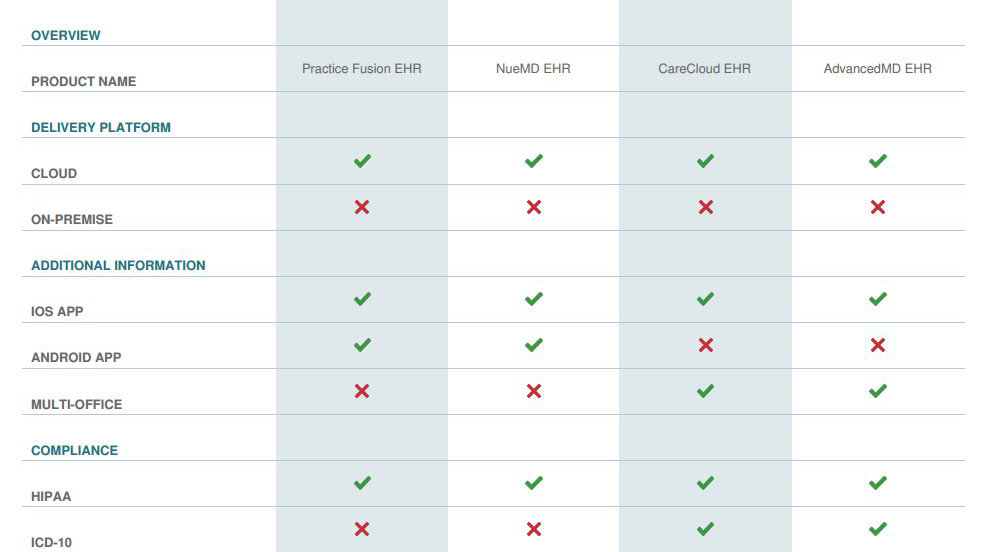Oncology EHR buyers' guide
Received wisdom states that oncology is among the most complex and data-intensive of medical specialties.
For the vital and difficult work carried out by oncology practices, the primary driver behind the improvement of oncological care has been oncology software that, according to the American Society of Clinical Oncology's 2017 State of Cancer Care in America:
“supports better clinical decision making, enables quality improvement interventions, and facilitates new types of research studies. Ultimately, these systems should allow researchers and clinicians to leverage real-world experiences to improve cancer prevention, diagnosis, treatment, and survivorship care.”
EHRs occupy an important role in both the delivery of oncological care and in the larger mission of data collection for clinical decision making and cancer research. Generic EHRs or those modified to work in specialty practices do not offer the specific modules oncology EMR software provides, and may be limited in their effectiveness.However, oncology practices’ requirements from a clinical perspective and from an administrative perspective will determine the type of oncology EHR they select.
What requirements do oncology practices have for EHR software?
Practices who are choosing an oncology IT system will realize that their practice requirements run the gamut between a number of areas that range from basic clinical data collection and patient population management, to more complex and data-intensive requirements such as tumor staging and chemotherapy dosing and administration, and survivorship care which requires an oncology-specific EHR.
At a minimum, an oncology EHR should maintain an ONC-ATCB certification, a voluntary certification program established by the Office of the National Coordinator for Health IT to provide for the certification of health IT standards, implementation specifications. An ONC-ATCB certification ensures that an EHR has met required Meaningful Use objectives and measures.
Accordingly, an oncology EHR should help meet both clinical and administrative practice requirements, and also offer data collection and analytical capabilities. The following list of requirements are required for meeting ONC-ATB certification, and by association the minimal requirements needed for an oncology practice.
- Capturing and managing patient demographics and clinical information.
- Recording detailed cancer diagnosis information including stage, tumor measurements and graphical representation, chemotherapy recording, oncology specific templates, etc.
- Clinical decision support and scheduling for chemotherapy prescription and administration.
- Privacy and security of all patient data and compliance to industry standards
Which EHR features should oncologists look for?
The above requirements are a solid baseline for providing high-quality patient care. In order to meet these requirements, and enjoy a range of extra benefits such as improved practice efficiency, there are a number of EHR features you should consider. These include:
- Interoperability: sharing clinical information across care settings and for disease surveillance and research purposes is vital to the oncology field. As such an oncology EHR should be interoperable with other EHRs.
- Treatment plans and treatment summary support: an EHR should be able to generate dynamic treatment plans and treatment summary support by extracting data from relevant fields throughout the EHR.
- Coordination of care support: the transition from active treatment to post-treatment care is critical to long-term health for oncology patients. As such an EHR should be able to provide a clear follow-up plan of action and be able to communicate this plan with other providers.
- Advanced data collection and analysis: an oncology EHR should be a “learning health care system”. According to the National Academy of Medicine, “a learning health care IT system for oncology will promote high-quality care by providing new tools for informed medical decision making, expanding the evidence base by using data from patients in routine practice, and collecting and implementing quality improvement metrics. The data to drive this system already exist in oncology and can be aggregated from EHRs and other data sources, such as claims data, tumor registries, and clinical trials, which has led to the priority within the oncology community to develop the health IT capabilities needed to create a learning health care system for cancer.”
- Quality reporting: in light of MIPS performance standards and the upcoming value based reimbursement system set to go into effect in 2019, an EHR should offer features that allow quality data reporting and analysis to comply with Medicare quality reporting requirements.
How much does oncology EHR cost?
Making sure the cost of onco EHR systems can be reconciled with a practices' financial considerations is an important consideration for oncologists.
Although cost varies based on the level of oncology EMR functionalities and the method of deployment, compared to general EHRs, oncology EHRs generally cost more. However, the variation in price depends on a number of factors and is largely vendor-specific. For example, Varian and FlatIron Health’s products (discussed below) can cost upwards of $1300 per month while other EHRs that contain less sophisticated features can cost around $600 per month. Like any other EHR additional add-ons and discounts can impact the cost of the product.
Which EHR vendors should oncologists consider?
The oncology software vendors offering products on the market today offer a range of products anf functionalities. However, the pricing for these systems appears to be scaled toward larger cancer centers but not in the range of smaller community practice oncologists. The vendors and products profiled here represent a portion of the oncology EMR market and is not an exhaustive list.
CureMD Oncology EHR
CureMD offers fully cloud-based EHR with an integrated practice management and patient portal. Comparatively, CureMD oncology is a smaller scale oncology vendor in terms of volume. Despite their smaller portion of the oncology EHR market share, CureMD has been able to offer a sophisticated product that competes on a par with larger volume vendors.

CureMD's clinical decision support feature
In addition to its basic suite of features, CureMD’s oncology EHR offers the following advanced functionalities:
- Evidence-based regimen library: standardized order templates are organized based on disease categories and treatment types. Personalized protocols can also be created to address disease complications, patient specific needs and drug replacements.
- Clinical decision support (CDS) monitors changes in factors like BSA and lab results to detect hepatic or renal dysfunction. Actionable Alerts allow for implementing recommended changes with a single click.
- Chemotherapy ordering, prep and admin. Required drug volumes are automatically calculated. The system distinguishes between single and multi-dosage vials to determine wastage appropriately.
- Charge capture: integrated charge capture collects all billing information from chemo documentation along with services such as venipuncture or a saline flush. An NDC Library helps the system generate complete claims ready with modifiers.
- Therapy flow sheets: integrated flow sheets provide a complete view of all therapy characteristics including historical dosage changes, lab trends and adverse events throughout the treatment life cycle.

CureMD's combination regimens
ARIA Oncology Information System - Varian
ARIA oncology software touts itself as an EHR and information system that offers practice management and advanced data analytics features as an add-on that can be purchased. Varian oncology software contains the following features:
- Image reviewing system: supports review of MV, kV, conventional CT, CBCT, MR and PET images.
- Diagnosis-specific data analysis: allows users to compare acute responses to treatment and long-term clinical outcomes.
- Auditing of patient charts: charts can be audited regularly for compliance and identification of any treatment changes required.
- Development of disease-specific clinical protocols to facilitate a standard, consistent quality of care.
- Radiation dosage monitoring: monitor radiation dosages and review treatment images to determine if plan changes are required.
- Care plan creation: Users can create structured, oncology-specific care plans for post-treatment care.
- Embedded rule-based decision support: allows users to make clinical decisions with the aid of embedded rule-based decision support.

ARIA's iPad interface
OncoEMR (Altos) - Flatiron Health
Known previously as OncoEMR Altos, now known as OncoEMR by FlatIron Health, OncoEMR offers a cloud-based EHR with optional practice management add-ons. OncoEMR provides the following features beyond its standard oncology EMR features:
- SureScripts-certified e-prescribing: offers PQRS reporting, scheduling, chemotherapy regimens, physician noting.
- SeeYourChart: a patient and provider portal, offering electronic faxing, and Meaningful Use training. The OncoEMR patient portal also allows patients to access their records, billing, and appointments by using the secure oncoemr login from any remote location.
- OncoEMR: mobile EHR available online, iPad, iPhone and Android.
iKnowMed EHR - McKesson
iKnowMed EHR by McKesson offers one of the more comprehensive web-based oncology EHRs on the market. The system offers the following features:
- My Care Plus patient portal: a patient portal capable of allowing patient communication and a practice management system interface capability.
- Workflow dashboard: offers a dashboard view of daily schedule, patient list, workflow queues and tasks. The dashboard also intuitively allows users to view patient charts and choose personalized templates for order sets and encounter notes.
- Mobile accessibility: allows secure, web-based and mobile-optimized access to patient charts from almost any mobile device, at any time of day.
- Clear Value Plus SM: point of care decision support relying on for evidence-based regimen support.
- Patient safety notifications: system notifies staff when potentially dangerous chemotherapy dosing levels, lifetime maximum dose or medication or allergy conflicts are detected.
- Chemotherapy order management: allows scheduling treatment time and optimization of inventory levels with Lynx mobile integration.

A patient profile in IKnowMed

















